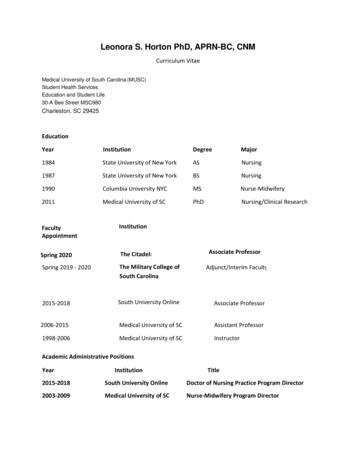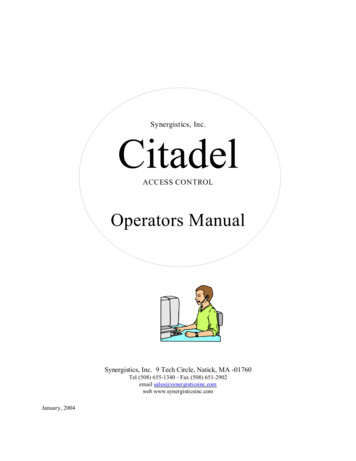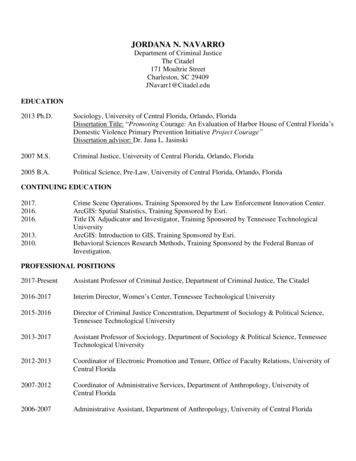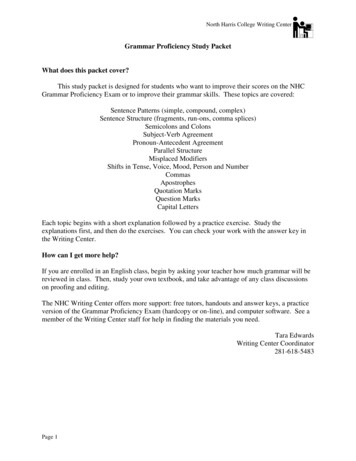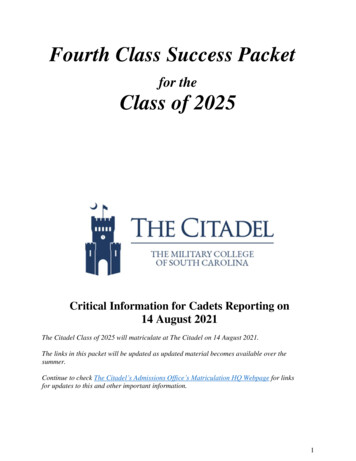
Transcription
Fourth Class Success Packetfor theClass of 2025Critical Information for Cadets Reporting on14 August 2021The Citadel Class of 2025 will matriculate at The Citadel on 14 August 2021.The links in this packet will be updated as updated material becomes available over thesummer.Continue to check The Citadel’s Admissions Office’s Matriculation HQ Webpage for linksfor updates to this and other important information.1
UpdatesChange #1DateTopicPage#6/17/21Hand Release Pushup23-242
Table of ContentsWelcomeMissionThe 4-Year Leader Development ProgramThe 4th Class SystemCore ValuesDrugs, Tobacco and Alcohol PolicyReserve and National Guard DutyLeave PolicyHealth ServicesSpecial Medical and Dental ServiceLegacy Company AssignmentsTransfer Students and the 4th Class SystemConfidentiality of Student RecordsMailAnnex A: Clothing and Personal Items to BringAnnex B: Shoes and BootsAnnex C: Physical FitnessAnnex D: Personal Grooming Standards3
WELCOMECongratulations! If you are reviewing this “Success Packet” then you have made your decision, orseriously considering, to attend The Citadel. We hope this “Packet” will help you prepare forMatriculation Day (the day when you report) and set you up for success throughout your freshmanor “knob” year.Having a successful knob year begins well before you report. It starts with once you make thedecision that The Citadel is the place for you. At that point, you should begin preparing yourself,mentally and physically, for what will be a challenging first year. It will be tough, but it is worth itthrough the relationships you make, the opportunities made available to you and the level ofpersonal growth you will experience that no other college or university can match.We published this packet early so you can begin studying and getting the supplies you need.Because it is early, some of the links will refer you to last year’s documents. Although most of theinformation remains current, we will update those links as the new documents become available –so it is important that you keep checking back at the Matriculation Headquarters website.Again congratulations on your decision to choose the “road less traveled.”THE CITADEL’S MISSION“To educate and develop our students to become principled leaders in all walks oflife by instilling the core values of The Citadel in a disciplined and intellectuallychallenging environment”THE CITADEL’S FOUR-YEAR LEADER DEVELOPMENT MODELThe Citadel recognizes that developing into a Principled Leader is a lifelong process of educationand experience that begins before matriculation and continues long after graduation. Leadership isinherently relational, and to be effective, requires actions and characteristics that influence otherstoward positive, beneficial change. Therefore, while leadership development may begin with one’sown development, at its best, leadership is not about one’s self or personal success but rather aboutdeveloping and serving others in ways that help everyone to succeed together.While leadership education and development draw from many different leadership approaches,styles, and techniques, none alone serves equally well in every possible context and situation. Tobe fully effective and successful, emerging leaders must understand and master an array ofconcepts to discern the type of leadership that will be most effective in a given situation.Recognizing that The Citadel’s mission calls for preparing principled leaders in all “walks of life,”students learn a wide range of leadership approaches and techniques that this program tests inproven, diverse organizational settings.Applying two of the key concepts within The Citadel’s mission, the Cadet Leader DevelopmentProgram emphasizes the importance of development and environment. Development engages aprocess in which the individual becomes able to respond effectively in many different situationsand integrate many diverse experiences. The environment consists of the context in which the4
development process occurs, including the challenges and support that enable such growth, both inthe classroom and beyond.The Citadel’s Core Values of Honor, Duty, and Respect serve as the Foundation of our LeaderDevelopment Program. Honor - preserves the moral authority and trustworthiness leaders must earn to effectivelyinfluence others. People of honor lead with integrity and conduct themselves with theknowledge of being part of something larger than they are. A person of honor does the rightthing the right way – even when no one is watching or when there is a risk of personal cost.This value begins with personal adherence to the letter and the spirit of the Honor Code thatstates a cadet does not lie, cheat, or steal, nor tolerate those who do.” In its more advancedstages, honor includes forging a unity of values that guides the action of all members of theorganization. Duty - instills a personal sense of accountability and eagerness to lead others to missionaccomplishment. It means doing what needs to be done without being asked or ordered. Astrong concept of duty allows a leader to persevere in overcoming obstacles and challengesand lead their team to success. At The Citadel, this value begins with adherence to the CadetRegulations. In its more advanced stages, duty includes building an organization in whichindividuals act on their own initiative to fulfill a common vision. Respect - encompasses self-respect and respect for others. Leaders earn respect bydeveloping the technical, interpersonal, and conceptual skills necessary for building teamsand leading others. Respect means recognizing and nurturing the inherent dignity and selfworth of each individual and creating the opportunities uniquely needed for them to growindividually and contribute to the organization. This value begins with protecting basichuman rights and civil liberties. In its more advanced stages, respect includes empoweringmembers of the organization to become the best version of themselves possible.The Citadel Experience integrates the core values across four functional areas, known as pillars: Character: The concepts undergirding this pillar represent a consistent thread that runsthrough all aspects of The Citadel Experience. This functional area instills the high moralstandards represented by the college’s core values and the key characteristics manifested byprincipled leaders who act accordingly. Such leaders demonstrate integrity, truthfulness, andtransparency in word and deed, building trust in those around them. Such leaders holdthemselves and others accountable for these moral and ethical standards. Such leadersconsistently uphold these standards into every aspect of problem solving and decisionmaking, avoiding merely temporary, pragmatic, or convenient solutions. Academics: Academic success provides the requisite specialized knowledge and skills tosucceed in a chosen professional field or career path. This pillar encourages lifelong learningand shapes intellectual ability by expanding knowledge, developing critical thinking skills,analyzing complex problems, and producing innovative solutions. The Citadel’s challengingacademic environment enhances mental agility and flexibility in thinking strategically,applying theory practically, and engaging others cross-culturally. For emerging leaders,academics lay the foundation for the technical, interpersonal, and conceptual skills that areindispensable for effective and ethical leadership. A well-educated cadet engaged in a strong5
core curriculum in the humanities, sciences, and math also increases the capacity forapplying sound judgment and for influencing and serving others. Military: Since its founding in 1842, The Citadel has combined rigorous higher educationwith a classical military environment for character formation and leader development. Themilitary pillar develops personal discipline, a commitment to serve, and a strong sense ofhonor, duty, and respect. It also creates an environment for cadets to experience anddemonstrate a capacity for teamwork, genuine respect for others, and mutual accountabilityamong team members. The derived lessons and experience equip cadets for building andleading teams, reinforcing the importance of accomplishing a mission, and instilling anunderstanding of leadership as service. In application, cadets train in the Citadel TrainingModel (CTM) and acquire specific leadership skills learned through executing the CTM. Fitness: A focus on fitness engages cadets in developing the physical and mental strengthand endurance necessary to attain an optimum functioning of their bodies and minds, evenwithin environments of prolonged stress. The Citadel creates systems that enhance andmonitor fitness for each cadet through bouts of physical and mental challenges, along withproper recovery from those challenges. These systems are created in recognition of the factthat those who are fit and healthy tend to be able to handle stress better, work harder, andtend to project a competent and confident presence that resonates with others. Beyond justhelping cadets maximize their personal fitness, this pillar seeks to develop leaders who cancreate environments that support organizational fitness and health. Through the fitness pillar,The Citadel prepares cadets to become leaders who can make substantial contributions tosociety through their embodiment of those essential fitness characteristics necessary forproductivity at every level – organizational, community, and national.Over their four-year cadet career, cadets steadily confirm their values and enhance theirleadership effectiveness. While each cadet advances along a unique trajectory in leadershipdevelopment, The Citadel model leverages the curricular and co-curricular in tandem eachsemester that a student is enrolled. Therefore, students are engaged in a leadership curriculum asthey experience leadership roles and responsibilities in the South Carolina Corps of Cadets(SCCC). During this process, The Citadel identifies four distinct, but overlapping, stages thatcorrespond with class years: freshmen - prepare, sophomores - engage, juniors - serve, andseniors - lead. In each stage, cadets participate in a combination of academics, training, andexperiential learning that exposes them to the art and science, the theory and practicalapplication, the extrinsic and intrinsic, and the learning and doing aspects of leadership.THE CITADEL’S FOURTH CLASS SYSTEMThe Fourth Class system is a key component of the “prepare” stage in The Citadel’s four-yearleader development model. It is more than merely a rite of passage. It is a purposeful programdesigned to teach followership, instill discipline, transition cadet recruits into the corps, andbuild self-awareness. The system makes deliberate use of artificial stress to accelerate thetraining process.The Objectives of the Fourth Class System: Provide new cadets with an understanding of The Citadel’s core values of Honor, Duty, andRespect.6
Teach new cadets the regulations, customs and traditions of The Citadel.Remove wealth and former station as factors in the development of new cadets.Instill in new cadets a sense of humility and selfless subordination.Develop personal character and create a foundation for honorable and ethical decisionmaking.Instill new cadets with self-discipline.Physically challenge new cadets and establish a foundation of understanding the necessity ofphysical fitness for life.Instruct new cadets in time management.Prepare new cadets for academic achievement.Inculcate class cohesion in support of The Citadel Mission to develop Principled Leaders.Knob year is challenging, demanding, and difficult. Although it has evolved over the years, itspurpose has remained the same since the first cadets reported in 1843. To succeed, one mustprepare mentally and physically before reporting. Mental preparation begins with theunderstanding that this is a personal decision to attend The Citadel followed by studying theGuidon (look for the 21-22 Edition during the summer). Physical preparation includes arrivingin shape (as defined later in this document) with the appropriate gear – to include shoes brokenin.Although the system is demanding and difficult, the rewards are considerable and more thanjustify the effort. Upon recognition by the upper-class cadets in the spring of the knob year, abetter person emerges – one who is mentally, morally, physically and spiritually prepared toaccept the responsibilities of leadership – a role that will ultimately be his/hers at The Citadeland in the world.CORE VALUESWe have already discussed our Core values of Honor, Duty and Respect. In order to understandhow they are supported in the daily lives of cadets, we recommend you review the following:Honor – A Cadet does not lie, cheat or steal nor tolerate those who do. This phrase unites allwho have graduated The Citadel knowing that those who wear The Citadel ring lived under astrict honor system, which we carried on in our lives after graduation. Violation of the HonorCode results in expulsion, which means you cannot return to the college. Memorized the HonorCode and read the Honor Manual before reporting – the link will be updated with the 21-22Manual when the new Honor Committee publishes it.Duty – The Commandant’s Department manages two documents you should familiarizeyourself before reporting: The White Book – tells you what we expect from our cadets The Blue Book – the rules and regulations of The South Carolina Corps of Cadets7
Respect – as stated above we define respect as “recognizing and nurturing the inherent dignityand self-worth of each individual and creating the opportunities uniquely needed for them togrow individually and contribute to the organization.” The Citadel is “one team” that can onlyreach its potential when everyone feels included and appreciated for the talents they bring to theorganization. This is why The Citadel does not discriminate on the basis of race, color, nationalorigin, gender, gender identity, sexual orientation, disability, religion, age, genetic information,or veteran status in its programs and activities.We all must be mindful of the little comments and actions that can be destructive to the moral ofindividual members of the Corps. That is not leadership and it will not be tolerated.Additionally, the behaviors such as hazing, sexual violence and discrimination can end yourcareer at The Citadel and negatively affect your ability to obtain future employment. Make sureyou review the associated documents – also consider discussing them with your parents orguardians since they are probably familiar with these issues from their workplaces. Hazing is prohibited. It is a behavior that is inconsistent with The Citadel’s core values,contrary to our Leader Development Model and dangerous to the well-being of others.Hazing is a violation of South Carolina Law and Citadel Regulations and is punishable by upto expulsion from The Citadel. Allowing any hazing to occur, condoning acts of hazing, orfailure to stop an incident of hazing where direct physical injury is also most likelypunishable by up to expulsion from The Citadel.Hazing is defined as –“wrongful striking, an unauthorized laying hand upon, threatening with violence, or offeringto do bodily harm by any student to another student, or any other unauthorized treatment byone student toward another student of a tyrannical, abusive, shameful, insulting, orhumiliating nature; or otherwise requiring any student to perform any personal service foranother student except as specifically provided for in Cadet Regulations.”Note the two components enforced in the Blue Book (page 21) – upperclass will not hazefreshmen and freshmen have an obligation to report any incidences of hazing. Title IX - The Citadel does not discriminate on the basis of sex in any education program oractivity that it operates. Additionally, The Citadel prohibits sexual harassment andretaliation by individuals subject to its control or supervision. Before reporting review ourTitle IX Grievance Policy whose goal is to prevent sexual harassment and effectivelyremedy the discriminatory effect of such misconduct when it occurs. Anti-Discrimination – Federal law prevents us from discriminating on the basis of race,color, national origin, gender, gender identity, sexual orientation, disability, religion, age,genetic information, or veteran status in its programs and activities. As leaders, we do notneed a law to tell us the value a diverse workforce brings to an organization and howdetrimental not selecting people based on their talents and experiences can be to a team’sperformance. Before reporting make sure you read The Citadel’s Discrimination Policy.USE OF ALCOHOL, TOBACCO & OTHER DRUGSThe Citadel prohibits the use of illegal drugs by faculty, staff, and cadets, and it supports onlythe legal use of prescription drugs, alcohol, and tobacco. The Citadel has a clear and unwavering8
policy of zero tolerance to drugs. Whether on or off campus, the possession, solicitation,distribution, sale or use of hallucinogenic, narcotic, other controlled drugs or substances, or anydrug paraphernalia, except in accordance with a legal prescription for such substances for thestudent possessing and using it, will result in permanent expulsion. The Citadel reserves the rightto test members of the Corps and conduct periodic searches of campus property for the presenceof illegal drugs and controlled substances. The use of tobacco or smoking products of any type isprohibited on property owned or controlled by The Citadel except for campus residences (notincluding the barracks) and as authorized by the President. Alcohol and Drug Policy is here. TheTobacco-Product Free Campus Policy is here.For private & confidential assistance with alcohol, tobacco and other drug concerns, pleasecontact the Director of the Campus Alcohol and Drug Information Center (CADIC), Mr. KevinM. Modglin (kmodglin@citadel.edu, 843-953-0510[office], or 843-813-6326 [cell/text]).Remote appointments via Skype, Zoom, or FaceTime are also available. Additional informationis available at www.citadel.edu/root/cadic.RESERVES AND NATIONAL GUARDCadets are authorized to be members of the Army, Navy, Air Force, Marine Corps, or CoastGuard reserve, as well as National Guard units; however, cadet responsibilities take priority overtheir reserve/Guard requirements. Cadets in these organizations must make arrangements to drillin the Charleston area. In addition, academic classes and certain cadet formations/events will notbe missed to meet drill requirements.LEAVE POLICYLeave is a privilege extended to those members of the Corps of Cadets who meet the requiredstandards of proficiency in academics, conduct, and physical conditioning. Parents mustunderstand that special leave is not authorized except in cases of extreme emergency orspecific family events. Cadets will NOT be authorized to depart early or return late fromfurloughs (Fall, Winter, Spring or Summer breaks). Should an emergency or an unexpectedobligation arise that cannot be rescheduled, the cadet may request permission for early/latearrival/departure or special leave. Cadets will not intentionally schedule jobs, job interviews,doctor appointments (see below) etc. that require them to leave campus early for furloughs orextended leaves. If an emergency or unforeseen obligation arises, the cadet must contact theCommandant’s Department immediately. All requests for special leave must be requested inwriting via the Commandant, with the final decision left to the appropriate Citadel authorityas to whether the circumstances warrant the granting of the leave.Please read the following excerpts from the Cadet Regulations:Emergency leave may be granted only upon request of the parent or guardian in the event ofdeath or critical illness of a member of the cadet’s immediate family. The immediate familyincludes parents, grandparen
Instill new cadets with self-discipline. Physically challenge new cadets and establish a foundation of understanding the necessity of physical fitness for life. Instruct new cadets in time manageme

